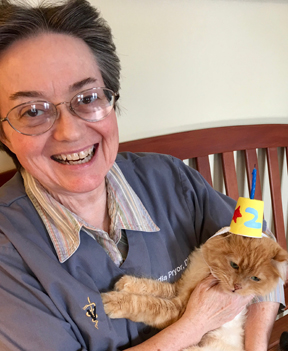
Dr. Pryor and Marvin 288

Photo by Melissa Parsons
Among the memories Dr. W. Lydia Pryor has from her practice, now closed, is this birthday celebration of Marvin, the clinic mascot, who was, she said, "a most extraordinary friend."
Like so many people these days, Dr. W. Lydia Pryor is anxious by day and sleepless by night. The 62-year-old veterinarian lives alone in a small town in rural Maine, during a time that the country is grappling with a pandemic and civil unrest.
But it's not the COVID-19 health crisis and widespread protests of police brutality and institutional racism that weigh on her the most. Pryor's more immediate problem is a lawsuit by a company that she'd happily done business with for nearly 10 years, and that now, in her view, seems bent on driving her into bankruptcy.
The company is Heska Corp., a Colorado-based business dealing in veterinary diagnostic equipment and supplies. In November 2017, Pryor signed a contract that committed her practice, BayView Animal Hospital, to doing $2,100 per month in business with Heska for six years, following one year of making no payments.
BayView met the conditions of the contract until last fall. On Oct. 31, Pryor closed the clinic after being advised by her accountant that the practice income was unsustainable.
Pryor returned the diagnostic equipment — four machines that analyze various aspects of blood, collectively valued at just under $50,000 — to Heska. Understanding that she had five years left on the contract, she offered the company a $12,500 payout. Heska countered, she said, with a request for $40,000, due within 12 months. She told them $12,500 was all she had. Their talks ended there.
On April 1, one day after Maine's governor issued a stay-at-home mandate to quell transmission of the virus that causes COVID-19, Pryor was served with a suit by Heska. The complaint says that the clinic owes the company "at least $159,878.41 plus interest at the rate of 18%."
Calling herself an idiot, Pryor doesn't dispute that she willingly signed a contract that provides no out. What bothers her is that a company reliant on business from veterinarians apparently lacks compassion for one in difficult straits. "It doesn't make any sense to me that they need veterinarians to purchase their equipment, and yet, they're perfectly willing to run us into the ground. At least, that's my perspective. ... " she said. "There's nothing to be gained. I'll be bankrupt, and there will be nothing left. What else can they get out of me?"
Heska executive Christopher Sveen disputes the characterization of his company as heartless. On the contrary, said Sveen, who serves as executive vice president, chief administrative officer, general counsel and corporate secretary, Heska's business model is based on working in partnership with veterinarians, making practice management more affordable.
"Our business model is to give equipment for free so veterinarians don't have to make the capital outlay, and we provide warranty, support and known pricing for future years," Sveen said, explaining that Heska doesn't sell the equipment, but retains ownership, making it available to veterinarians in exchange for a commitment to regularly purchase supplies, such as slides and reagents. The arrangement is like pledging to buy ink and paper from a vendor who provides a printer at no charge.
Sveen said he could not speak about Pryor's situation specifically, citing Colorado's "legal professional rules of reponsibility" and the pending litigation. "I am not in a position to comment on any particular veterinarian's financial condition," he said, adding, "To our knowledge, no veterinarian has ever come close to dire straits because of their relationship with Heska."
He continued: "With any company, not every relationship [with customers] is issue-free. Thankfully for us, very few of our customers experience difficulties, and we can deal with these on a case-by-case basis. From sales personnel to operations to the legal team, Heska employees are professional, hard-working and believe in the mission to serve veterinarians. ... We are not in the business of suing people."
'It's a problem'
But Pryor is not alone in her unhappiness with Heska. On message boards of the Veterinary Information Network, an online community for the profession and parent of the VIN News Service, at least 13 veterinarians have posted concerns about the company or its products since 2015. Complaints include poorly performing equipment, aggressive sales tactics, ineffective customer service, onerous contractual obligations and a tendency to threaten legal action. During the same period, at least three veterinarians have attested to satisfactory experiences with the company.
'Everything is negotiable'
Outside of VIN, as well, some veterinarians have expressed concerns about Heska.
Dr. Charlotte Lacroix, a veterinarian and lawyer based in New Jersey, said a number of practitioners have sought her help over the years for Heska-related problems.
"We've had clients reach out to us for help negotiating contracts, or trying to get out of contracts and avoid litigation," she said. "They were dissatisfied with the product, they were dissatisfied with the support service, they were dissatisfied about the communication between the equipment and software. They were assured there'd be no problem [addressing the issues], but that actually wasn't the case."
Asked how many times she's heard such criticisms, Lacroix replied, "Enough that I think it's a problem."
The problem, she noted, isn't limited to Heska. "I'm talking about all these companies that have either solely reference-lab contracts or contracts tied to a piece of equipment. I think you can dump them all in the same family," she said.
Antech and Idexx, the largest veterinary diagnostic laboratories in the world, routinely market long-term service contracts to veterinary clinics, offering equipment, rebates and other perks in return for years-long commitments to do a specified dollar amount of business.
Antech made headlines earlier this decade for suing multiple veterinarians for breach of contract. Many cases settled out of court. In disputes decided in court as of 2014, VIN News found that Antech prevailed.
Whereas Antech and Idexx provide offsite laboratory services as well as equipment, Heska's focus is diagnostic equipment and supplies that veterinarians use in-house. Based in Loveland, about 50 miles north of Denver, Heska is publicly traded on the Nasdaq Stock Market. It employs about 300 people in the U.S., according to company executive Sveen.
A search of court cases on LexisNexis, a database of public records, indicates that Heska has sued veterinarians and/or veterinary practices nine times since 2001, in cases involving breach-of-contract allegations or debt collection.
One active case involves Lakeshore Veterinary Specialists LLC in Wisconsin and Dr. Jacob Odders. The complaint states that three years into a five-year sales agreement, the practice breached the contract, for which Odders provided a personal guarantee. Heska seeks $78,123.84 plus interest.
In an answer and counterclaim, Lakeshore and Odders state that the practice "opted out of the contracts and has not been leasing the equipment from Plaintiff for several years," and that "[d]espite due demand by Lakeshore Vet, Plaintiff has failed to pick up the equipment ... as is required by the contracts," thereby breaching the contract and causing damage to the practice "by requiring Lakeshore Vet to pay for the cost of storing the equipment."
VIN News was unable to reach Odders; his lawyers did not respond to requests for comment.
Sveen said the number of active court cases involving veterinarian breach-of-contract claims is "very, very, very few."
He added, "We want to support the veterinarian in any way we can, even if that's ending the contract early in an amicable way. We do everything we can to make that happen."
'Worst decision of my professional career'
VIN News communicated with seven veterinarians who have had difficulties with Heska. While their circumstances differ, their antipathy to the company is similar.
"I seriously hate Heska," Dr. Kamran Khan said bluntly in 2017 on a message board of the Veterinary Information Network, an online community for the profession and parent of the VIN News Service. An owner of two clinics in Wisconsin, Khan said that obtaining laboratory equipment from Heska was "the worst decision of my professional career."
Khan said the equipment from Heska was error-prone; required more than twice as much blood per sample than described (a serious problem when your patients are small creatures such as cats, ferrets and reptiles); and frequently failed to communicate properly with his clinics' practice-management software. "[S]ometimes the wrong information is uploaded into a patient's chart," he said. He listed other problems, as well.
Before 2017, Khan said, he was a satisfied customer of Abaxis, a Heska competitor. What caused him to switch? In a word: salesmanship.
Khan was in the midst of setting up a second clinic at the time. Heska offered one year of free supplies and no equipment payments.
"I was shortsighted," Khan told VIN News in a telephone interview. "I thought, 'I need more cash flow. It will mitigate risk.' That's what I was mostly thinking. It was stupid."
Khan had a contract with Abaxis but, as he understood it, Heska would buy it out. He later realized that the contract he signed — without, he acknowledges, appreciating the fine print — deemed the contract buyout a loan, for which he owes Heska $300 a month for 5½ years. Heska also removed Khan's working Abaxis machines from the clinic.
Within the first week of using Heska blood analyzers, Khan said, he was unhappy with their performance. "I asked if we could just get out [of the agreement], and they said, absolutely not," he said.
Khan had read the contract, "but obviously not well enough," he said. "I probably should have had a lawyer go through it with me. My mistake for being stupid."
Bound to Heska for four more years, Khan's workaround has been to buy two Abaxis machines as backup, essentially double-paying for in-house diagnostic capability, inflating what would be an expense of $1,500 or so per month to twice that.
Taking on the extra expense is possible only because his practices are doing well, Khan said.
"It's just super-annoying, because I'd say that Heska fails about one in 10 times we use the machine. And we don't even call [for support] anymore because it's not worth the [staff] time to try to troubleshoot," he said. "We just skip that and use the Abaxis backup," which he estimates fails one in 100 times.
Khan's experience with Heska products has not been uniformly bad, though. "Their X-ray units are nice," he offered. "Those things are sweet. Cuattro, it's really top-of-the-line. ... It's weird that it's the same company."
Sveen, the Heska executive, reiterated that dissatisfied customers are "expected, but unusual" for the company. "Please let me be clear that in no way am I minimizing or trivializing anybody's individual experience or thoughts," he added. "If I say it's an anomaly, I am not disregarding those concerns in any way, shape or form. I really don't want to ever convey that 'Oh, that doesn't really matter.' Every single one of these customers matters to us."
He went on: "In the course of running millions of tests, at the highest levels of specificity and accuracy, confirmed and compared to benchmarks in universities, reference labs, research facilities, specialty hospitals and the like, it is a rare circumstance that a single hospital or clinic is experiencing a defect in technology. But when it happens, we actively remedy these issues."
'I couldn't be more all-in'
Pryor, the Maine veterinarian being sued by Heska, never had complaints about the company's product performance or any service issues. In fact, before she signed the current contract with Heska in late 2017, she had completed a 7-year contract with the company with no hitches.
"I had a great time with Heska," she recalled in a telephone interview. "I didn't have any problem with the equipment. I liked it. ... We were happy with it."
Although the two pieces of machinery were functional, after paying them off, Pryor sought to renew the sales contract because she wanted updated equipment that could measure thyroid, bile acid and cortisol levels.
"We could have just stayed where we were. We could have kept what we had," she said ruefully.
Shortly after recommitting to Heska, the practice business, never robust, started to decline. Its home in the little fishing town of Gouldsboro, population 1,644 at last count, never took part in the post-2008 recession go-go economy.
Sighing at the memory, Pryor said revenues in 2018 were down from 2017, and in 2019, "took a header." In the first quarter that year, during tax season, her accountant told her, "You're not making anything."
It wasn't that profits were down. The solo practice staffed with three full-timers and two part-timers had never turned a profit at all since its opening in 2010. "We were just kind of, I don't know what you'd call us. A community benefit?" Pryor said. "We were a tiny practice."
The practice was more than her business — it was her life. The clinic occupied the bottom floor of her two-story house. "I couldn't be more all-in," Pryor said.
As soon as she made the decision, in March 2019, to close the clinic that year, she began contacting Heska to discuss terminating the contract and returning the equipment, she said:
"They wouldn't call me back. I would leave message after message after message. For whatever reason, they would keep putting me to the voice mail of the salesperson. I would say, 'I don't know what the salesperson has to do with us closing the business.'
"So month after month, week after week, I would call, saying, 'I've got to talk to somebody about what we're going to do.' I couldn't get anybody, couldn't get anybody, couldn't get anybody."
Finally, just as the clinic was set to close on Oct. 31, she received a letter dated Oct. 28 from a law firm representing Heska stating that the company was willing to remove the equipment "in an effort to mitigate its damages," but that the practice and Pryor individually — because she had signed a personal guaranty — "remain fully liable for all obligations set forth in the Agreement."
As Pryor describes it, "They got ugly instantly. Instantly."
BayView Animal Hospital 288

Photo by Dr. W. Lydia Pryor
BayView Animal Hospital occupied the ground floor of Dr. W. Lydia Pryor's house in Gouldsboro, Maine, about 35 miles from Bar Harbor.
Heska executive Sveen said the company did respond to Pryor, much earlier than she describes. "We've been in regular and consistent contact with Dr. Pryor, and we document every single one of our communications," he said. "The assertion that she hasn't heard from us is just untrue." (Pryor firmly maintains that Heska did not contact her until three days before her clinic closed.)
In any case, Heska ultimately provided packaging and shipping labels so Pryor could return the equipment. She then hired a lawyer, an expense of $10,000, to try to negotiate a contract payoff. But the difference between what Heska wanted — $40,000 within 12 months — and what she could afford — $12,500 — was too great.
"At this point, I've lost the business, I don't have a job, I'm doing relief work here, there and yonder, I can't very well go to the bank and say, 'I need to borrow another $40,000, and I need to pay it off within a year,' " Pryor said.
"Even if I sold the house right now, there's not enough equity in it to pay anybody," she continued, noting that she borrowed against the house early on to set up the clinic. "I couldn't pay even half of what Heska's demanding, not to mention that the local bank gets first dibs anyway, because they have the lien on the house."
'You have a responsibility ... to carefully read vendor contracts'
Lacroix, the veterinarian in law practice, said that while disgruntled veterinarians may see Heska's arrangements as predatory, "at the end of the day, this is nothing other than informed negotiation. That there are things not to your advantage [as the buyer] doesn't make it predatory; it's just advantage to the other side. It's buyer beware."
Veterinarians need to understand, she said, that salespeople might not accurately represent contract terms. "The problem is that most salespeople are incentivized by how many units they sell, same as veterinarians are incentivized by their production. It's a tall order to say, 'they shouldn't be doing this' and 'they shouldn't be doing that' when, in our industry, we do the same. That's reality."
Asked whether Heska salespeople are paid a base salary plus commission, or commission only, Sveen declined to specify, except to say that they are "incentivized to build good relationships with veterinarians."
He added that Heska salespeople are "held to the highest standards," that he has held legal-contract training sessions for salespeople, and that they are "absolutely" expected to know the terms of the contracts and explain them clearly to all customers.
Lacroix urges veterinarians in business to be equally well-versed with contracts. "If you're a business owner, you have a responsibility to yourself and your business to understand business principles and carefully read vendor contracts," she said. She recommends hiring a lawyer for "the same reason people hire veterinarians [for pet health advice] rather than their local dog groomer."
In retrospect, Pryor wishes she had thought about what might happen if things soured. "When I signed the contract with Heska, it never occurred to me looking forward to what could happen," she reflected. "You always think everything will be fine.
"Looking back, I would do anything to have prevented this from happening, obviously. We didn't want to lose our practice. At this point, I've lost patients, clients, community, employees, and now I'm going to be bankrupt. ...
"I signed the damn contract," she allowed. "I can't say that I didn't. I just assumed they would be reasonable. ... Still, it was stupid. It was stupid. And I will pay dearly."